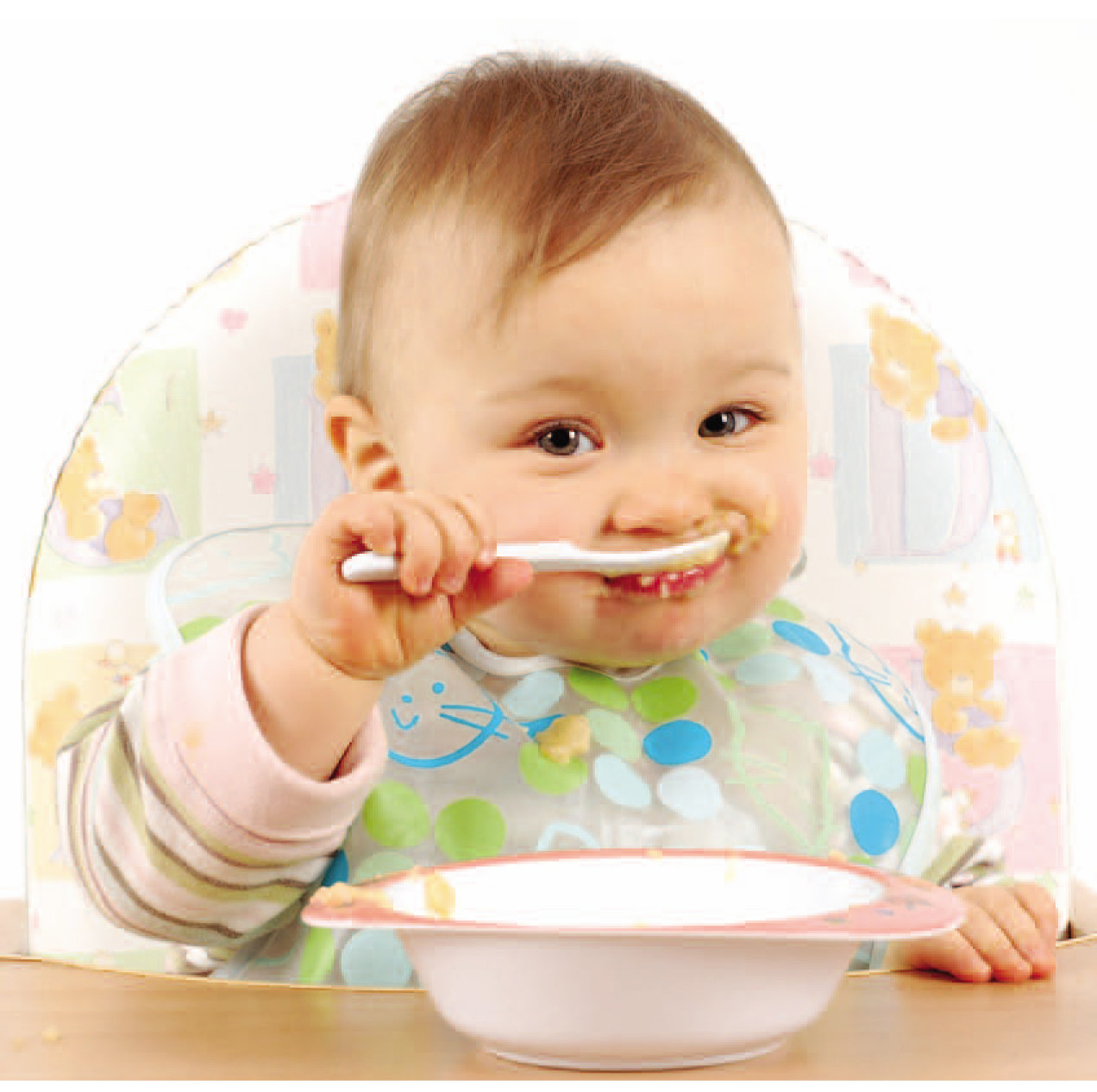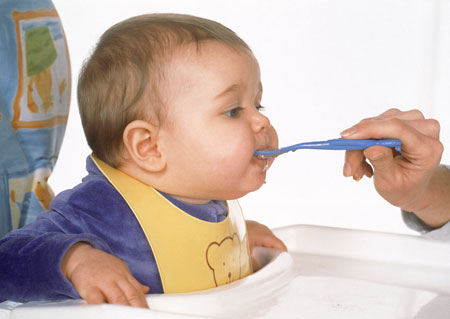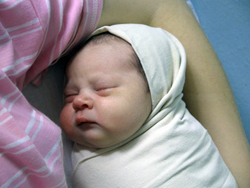Starting Solid Foods at Six Months |
 Since birth, your baby has been growing on breast milk. At six months old, breast milk is still the most important food but the time has come to add solid foods. Extra iron is needed at six months. Solid foods provide a variety of nutrients, flavours, and textures for your baby. Since birth, your baby has been growing on breast milk. At six months old, breast milk is still the most important food but the time has come to add solid foods. Extra iron is needed at six months. Solid foods provide a variety of nutrients, flavours, and textures for your baby.
How do I tell if my baby is ready for solids?
Your baby is ready to start eating solids when she:
- is six months old;
- holds her head up;
- sits up in a high chair;
- opens her mouth wide when you offer food on a spoon;
- turns her face away if she doesn't want the food;
- closes her lips over the spoon;
- keeps food in her mouth and swallows it instead of pushing it out.
Make sure your baby shows all of these signs of readiness before you start solid foods.
At first your baby may not accept new foods. If she shows you that she does not like the food by closing her mouth or turning her head away, stop feeding her that food. Try it again another day. Keep feeding time pleasant. If your baby feels... |
|
Read more... [Starting Solid Foods at Six Months]
|
When to start solid foods: Six months |
 When your baby is six months old he is ready for solid foods. Your baby does not need teeth to start eating solid food. Starting solid foods too early or too late can cause problems. When your baby is six months old he is ready for solid foods. Your baby does not need teeth to start eating solid food. Starting solid foods too early or too late can cause problems.
IF YOU: Start your baby on solid foods too early.
YOUR BABY MAY: Breastfeed less often causing you to make less breast milk. Stop breastfeeding too early. Not get all the benefits of breast milk such as protection from illness and allergies. Have lower iron levels. Have a diet low in protein, fat, and other important nutrients.
IF YOU: Start your baby on solid foods too late.
YOUR BABY MAY: Be slow to accept solid foods Have a hard time chewing food. Not get all the vitamins and minerals he needs, such as iron and vitamin A.
Growth spurts are common at about: three weeks, six weeks and three months. Your baby may want extra breast milk at these times.
-This is not a sign that your baby needs solid foods!
-It is too early to introduce... |
|
Read more... [When to start solid foods: Six months]
|
 For the first six months of life breast milk is the only food that your baby needs to grow and be healthy. Breastfeeding is the normal way to feed babies. For the first six months of life breast milk is the only food that your baby needs to grow and be healthy. Breastfeeding is the normal way to feed babies.
If you give your baby any other food, including infant formula, you will make less breast milk. If you stop breastfeeding, it can be hard to start breastfeeding again. Your baby will not get all of the benefits of breastfeeding.
- Breastfeeding is healthy, natural, convenient, and free. It is a good way to bond with your baby.
- Breast milk protects your baby from colds, infections, and allergies. Infant formula does not protect babies in the same way.
- Mothers who breastfeed have less risk of breast cancer, and ovarian cancer.
If you are breastfeeding, give your baby 10 micrograms (400 IU) of vitamin D each day. Continue until your baby is one year old and eating foods that have vitamin D. In Canada, the sun is not strong enough throughout the year for mothers and babies to make the vitamin D they need through their skin. Also... |
|
Read more... [Baby’s First Food]
|
Acid Reflux Symptoms in Newborns |
 There are many factors why newborn babies get a reflux. However, most of the causative factors tend to be aggravated by the fact that newborn’s digestive system is not yet accustomed to milk and they usually spend most of their time lying on their back. Acid reflux causes the acids from your baby’s stomach to regurgitate back into his esophagus. There are many factors why newborn babies get a reflux. However, most of the causative factors tend to be aggravated by the fact that newborn’s digestive system is not yet accustomed to milk and they usually spend most of their time lying on their back. Acid reflux causes the acids from your baby’s stomach to regurgitate back into his esophagus.
Some common symptoms of acid reflux in newborns would include; irritation while feeding, spitting up and vomiting frequently. Constant crying, wet burps, frequent coughing and hiccups, disturbed sleep and bad breath are some of the other symptoms of the condition. Another one of the symptoms of acid reflex in newborns is that Sometimes a baby will arch its back and pull up its legs while feeding.
It takes months for a baby to outgrow the symptoms of reflux. While you’re baby is only a week older or so, you have to take important precautions.It would be wise to use a few simple tips to get rid of this problem. It’s as easy as ABC... |
|
Read more... [Acid Reflux Symptoms in Newborns]
|
|
 Breastfeeding can be confusing the first time a new mother attempts it. Although it is one of the most natural things in the world and many mothers feel like they should be born knowing how to effectively nurse a child at the breast, it can be hard to know exactly what to do or how to do it. Here are some essential breastfeeding tips to discuss with your doctor or midwife. Breastfeeding can be confusing the first time a new mother attempts it. Although it is one of the most natural things in the world and many mothers feel like they should be born knowing how to effectively nurse a child at the breast, it can be hard to know exactly what to do or how to do it. Here are some essential breastfeeding tips to discuss with your doctor or midwife.
Put the baby to the breast as early as possible - It is good to have your first breastfeeding session within an hour after giving birth, if possible. This is the time that the baby is alert after the activity and work of being born and the sucking instinct is strong. You will not be producing milk this early but your breasts contain colostrum, which is a thin milky fluid that contains important antibodies to disease. It is a perfect first food for your new sweetheart.
Offer frequet feedings - It is a good idea to try nursing your baby every two to three hours. This can help keep your breasts soft and aid in the... |
|
Read more... [Breastfeeding Tips]
|
|
|
|
|
|
|
|
|